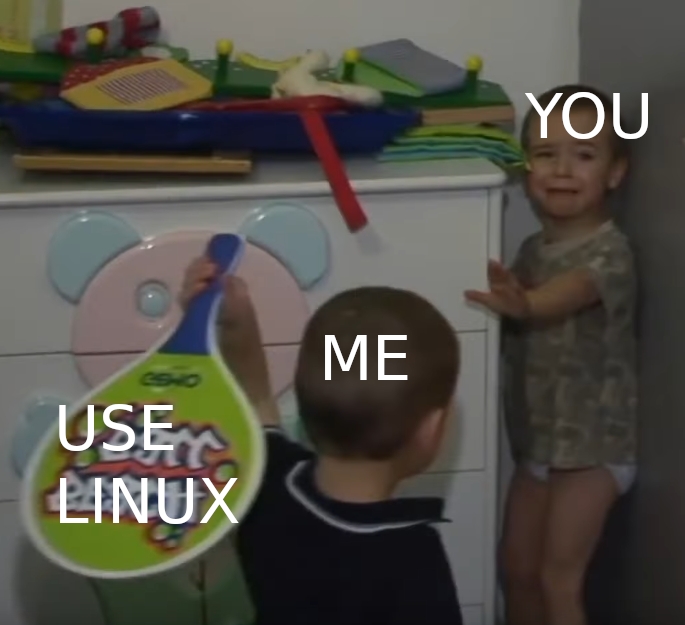this post was submitted on 02 Jun 2024
844 points (95.2% liked)
linuxmemes
21180 readers
899 users here now
Hint: :q!
Sister communities:
- LemmyMemes: Memes
- LemmyShitpost: Anything and everything goes.
- RISA: Star Trek memes and shitposts
Community rules (click to expand)
1. Follow the site-wide rules
- Instance-wide TOS: https://legal.lemmy.world/tos/
- Lemmy code of conduct: https://join-lemmy.org/docs/code_of_conduct.html
2. Be civil
- Understand the difference between a joke and an insult.
- Do not harrass or attack members of the community for any reason.
- Leave remarks of "peasantry" to the PCMR community. If you dislike an OS/service/application, attack the thing you dislike, not the individuals who use it. Some people may not have a choice.
- Bigotry will not be tolerated.
- These rules are somewhat loosened when the subject is a public figure. Still, do not attack their person or incite harrassment.
3. Post Linux-related content
- Including Unix and BSD.
- Non-Linux content is acceptable as long as it makes a reference to Linux. For example, the poorly made mockery of
sudoin Windows. - No porn. Even if you watch it on a Linux machine.
4. No recent reposts
- Everybody uses Arch btw, can't quit Vim, and wants to interject for a moment. You can stop now.
Please report posts and comments that break these rules!
founded 1 year ago
MODERATORS
you are viewing a single comment's thread
view the rest of the comments
view the rest of the comments

Because I know that nvidia is not really good on linux, you can try using pop os because they have pre-installed nvidia drivers
Seriously, you guys need to stop trying to troubleshoot Linux's shortcomings at people. I know. Everybody knows. If you don't, that's the first thing any tutorial will tell you. I'm not looking for technical help, just sharing an anecdote.
If you're curious, no, I couldn't do Pop because I needed some specific libraries and kernel modules to support this particular device's power management and I/O quirks and those were only officially supported in a handful of distros, so I picked one of the ones with better documentation, and even that wasn't meant for my specific hardware.
Not that it matters, because it's a laptop with a iGPU and a dGPU, and the Intel iGPU was just fine out of the box, so getting the Nvidia dGPU to work well was way down my priority list for this exercise, since the device was meant mostly for web browsing and media consumption. Instead, I had issues with sleep mode, since that was related to those specific modifications, and I coudn't figure out a way to make it wake from boot without locking up, which is a pretty big dealbreaker for a device on a battery. Plus the embedded audio controls had some issues, the touchpad was flaky and eventually trying to go through the process of getting that dGPU running exposed other compatibility troubles.
I was ready to roll back to Windows once I noticed the touchpad acceleration was messy out of the gate, honestly, that's my bar for troubleshooting tolerance. So no, I didn't fail to do a cursory Google search in 2020 and find out that Nvidia support is messy. I knew that my slightly nonstandard device was going to be a bit of a challenge, but was hoping to get lucky. Didn't get lucky and went back to what works on it. It's not a call for help, it's just a thing that happened last time I tried to switch a device to Linux.
Something doesn't add up. My guess is you're using a MacBook but don't want to tell us for obvious reasons.
There's literally no reason for "specific libraries and kernel modules" when installing Linux on any x86 PC. It makes no sense.
If they said that they went “back” to Windows, why would you assume a MacBook?
Hah. Nope. There's a ton of custom features on hardware that need tweaking all over Windows laptops. There are entire forums dedicated to specific brands out there. None of this was much of a surprise, I had put off giving this a try because I had read about the hoops I'd have to jump through and been too lazy to try.
Huh. I've installed Linux on anything from an old 32bit netbook to a Fujitsu convertible that both had such a fucked up UEFI implementation they couldn't even boot a standard Windows ISO without Ventoy in grub mode, as well as a cobbled-together Workstation with Nvidia graphics, and never ran into issues like this.
To each their own, but I can tell you I found people flagging all the issues I encountered online.
What is this mysterious device that requires specific libraries and kernel modules? So I can state the fuck away from the device and the brand
obvious troll is obvious.
Believe what you want. I actually would like to move some (more) of my devices over. I'm just not so married to any one OS to try super hard. I just use whatever works.
It's kinda nuts to me that not everybody is on the same page with that.